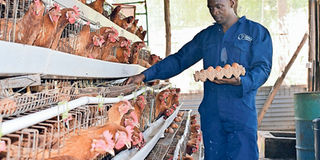For good profits from poultry, I sell my birds to small food joints only

Steve Kamwa, the director of Kamsa Poultry Farm in Kisumu, collects eggs from the cages where he keeps his birds. He sells the Kienyeji chickens to eateries in Kisumu when they attain about 2kg. PHOTO | ELIZABETH OJINA | NMG
What you need to know:
- The farmer started the poultry venture in 2013 after realising there was rising demand for eggs.
- To keep diseases at bay, he vaccinated the birds against Gumboro at day 10, Newcastle disease at day 20 and 30, among others.
- Poultry business needs steady capital flow, the reason I sell to the eateries because they pay immediately. Big hotels tend to take long in making payments.
- Currently the supply of eggs from Uganda is high. Most of the retailers buy Ugandan eggs at Sh260 per tray. They then want us to sell our eggs at the same price yet our production costs are much higher
Steve Kamwa is dressed in navy blue overcoat and a pair of white gumboots when we meet him on his farm in Ololo, Kisumu County.
The proprietor of Kamsa Poultry Farm keeps his 1,200 layers in 100ft by 20ft structure under the battery cage system.
He also has 500 Kari Kienyeji birds for meat, which he keeps under the deep litter system. “We collect our eggs in the morning and evening. Our daily egg collection averages 35 trays,” says Kwama.
The farmer started the poultry venture in 2013 after realising there was rising demand for eggs.
“There was a shortage of eggs at that time. The prices of the eggs rose to Sh20 each. I saw an opportunity,” says the farmer.
He ploughed at least Sh70,000 into the business, starting with constructing a 15ft by 7ft structure and bought 100 Kari chicks at Sh100 each.
Months later, he imported the battery cage with a capacity of 300 birds at Sh150,000 from China.
“I placed an order online, it was shipped and I picked the cages from Nairobi. All my layers are now under deep litter after I added more cages.”
To keep diseases at bay, he vaccinated the birds against Gumboro at day 10, Newcastle disease at day 20 and 30, among others.
“I haven’t had any problem with diseases since I embraced the cage system. But this is also because of vaccination and high standards of hygiene.”
His day starts at 5am, where he feeds the birds with the help of his two workers.
“We also clean feeding troughs and drinkers. We start with the cockerels before moving to the hens. Handling hens is much easier because they are in cages. We dust the cages, disinfect the floor, remove the droppings, clean and fill the drinker with water and finally feed the birds,” he explains.
In a day, the hens consume two 50kg bags of feeds and by the time the day-old chicks reach one month, they would have consumed about 10 to 15 bags of feeds.
“Feeds consume a lot of costs and one must be prepared to spend. Each bag goes for between Sh2,000 and Sh2,500 depending on stage of growth.”
CHALLENGING CHEAPER EGG IMPORTS
He is reluctant to formulate his own feeds because of the challenge of getting quality raw materials.
“Poultry farming is a very sensitive venture, if you want to achieve success you ought to give it full attention. Any slight change in routine and you will experience a sharp decline in the production of eggs or pest and diseases set in,” says Kamwa, who was a supervisor of raw materials at Unga Ltd, Nairobi, where he worked for three years and quit in December 2016.
He sells the Kienyeji chickens to eateries in Kisumu when they are about 2kg.
“Poultry business needs steady capital flow, the reason I sell to the eateries because they pay immediately. Big hotels tend to take long in making payments,” says the 35-year-old farmer.
He sells a cockerel that weighs 1.5kg at Sh550 while 2kg bird costs Sh700. For those who buy in bulk, the cost goes down to Sh500 for the 1.5kg bird. He sells a tray of eggs at Sh300.
“Poultry business is well-paying if one manages diseases because you rake good profits from meat and eggs.”
He works with three farmers in area to meet orders from his clients.
His major challenge is the cheaper egg imports from Uganda.
“Currently the supply of eggs from Uganda is high. Most of the retailers buy Ugandan eggs at Sh260 per tray. They then want us to sell our eggs at the same price yet our production costs are much higher,” he offers, adding it costs him Sh400 to raise chicks to maturity.
The lower price of broilers which goes from Sh300 to Sh400 also adds challenge to his business, but his main saviour is that customers in hotels demand for Kienyeji birds.
Amos Amenya, an agronomist at the Lake Basin Development Authority, says farmers in countries like Uganda and Rwanda enjoy subsides on the agricultural raw materials and machinery.
“This helps farmers in cutting the cost of production. Well our retailers prefer cheap products, therefore they would rather rush for Ugandan eggs. The government needs to review and subsidise some agricultural products like feeds if Kenyan farmers are to compete with their counterparts.”




